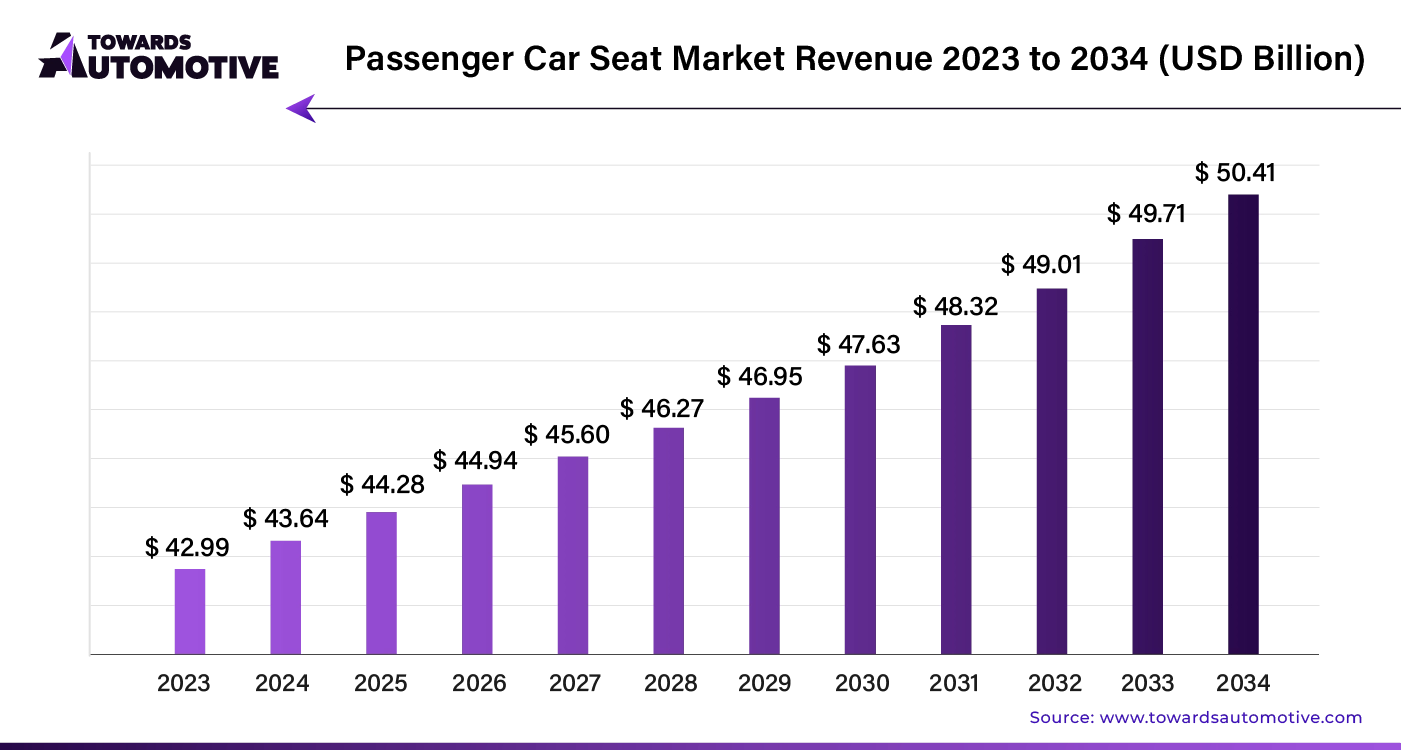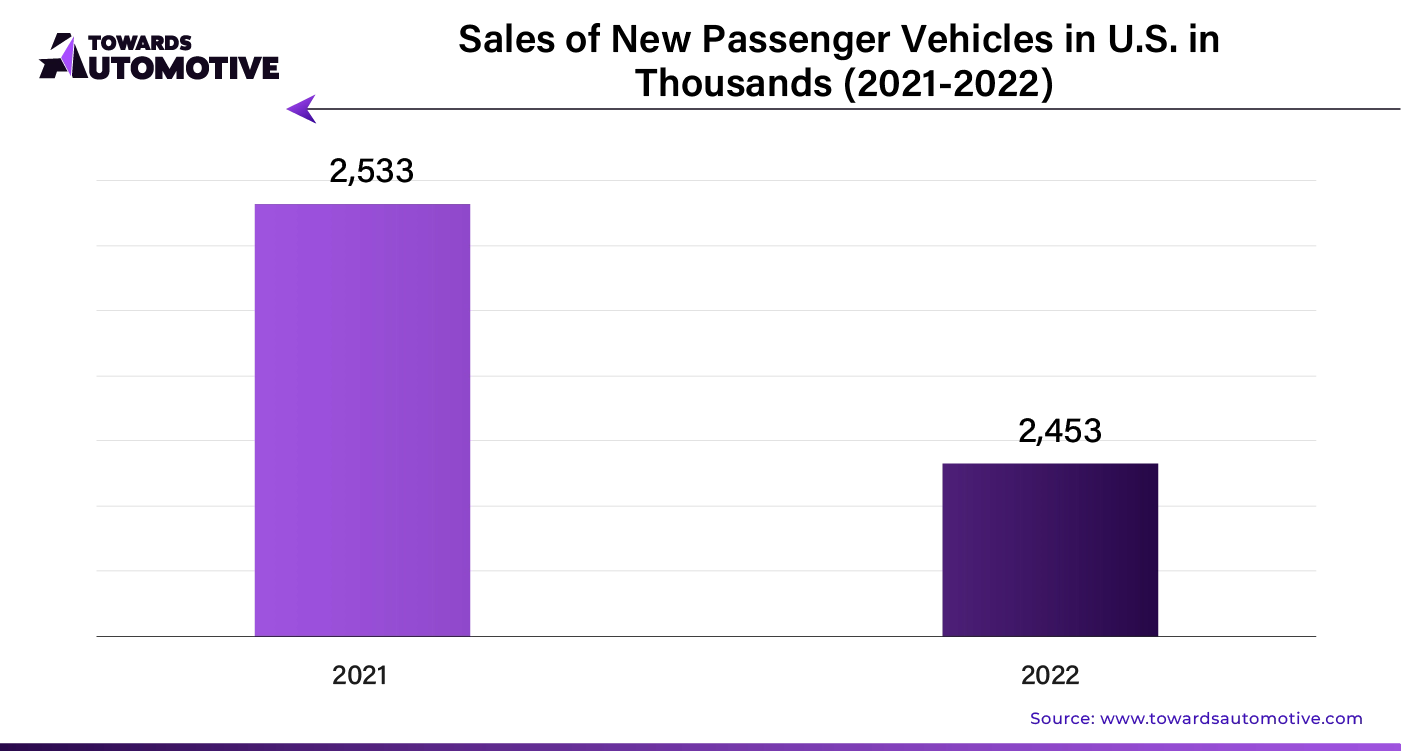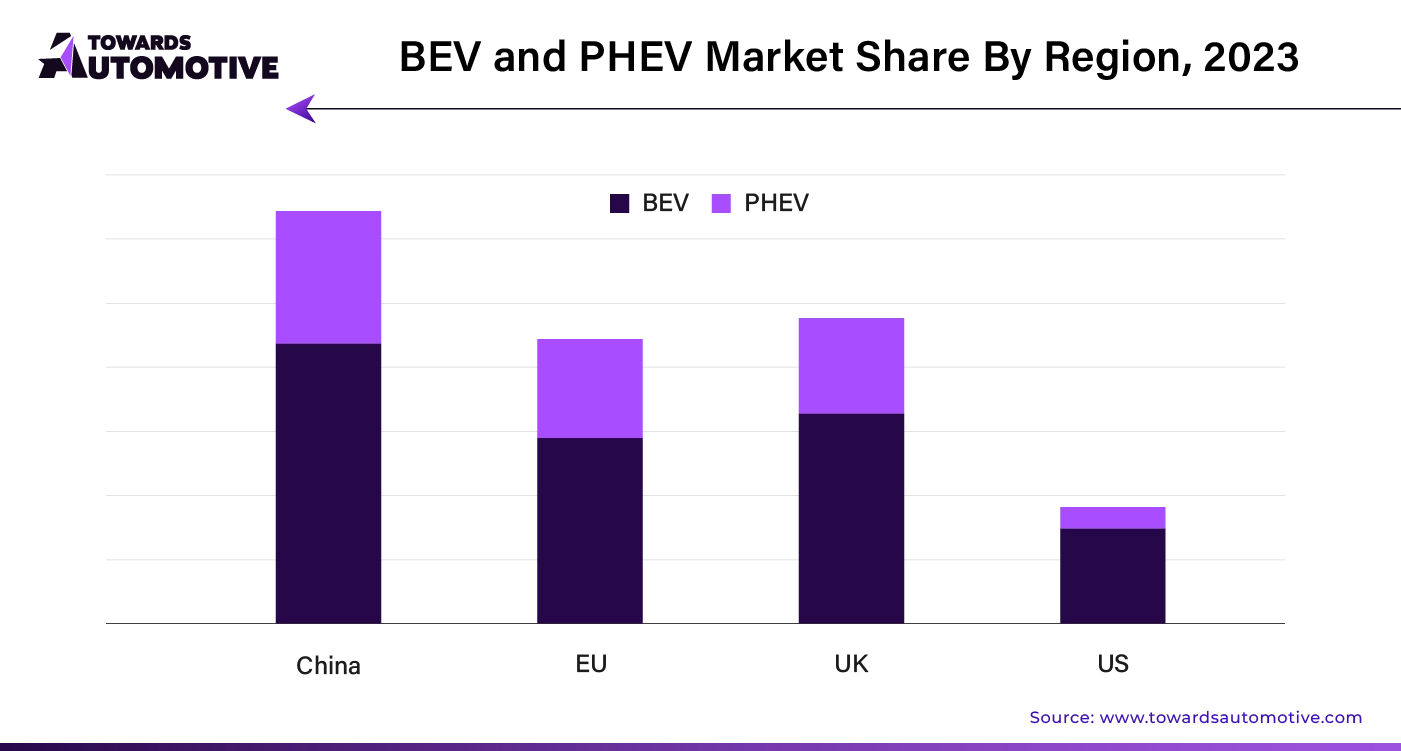October 2025
The global passenger car seat market is projected to reach USD 50.41 billion by 2034, growing from USD 44.28 billion in 2025, at a CAGR of 1.54% during the forecast period from 2025 to 2034.

Automotive manufacturers are increasingly using lightweight materials like high-strength steel, aluminum, and carbon fiber composites to reduce vehicle weight and boost fuel efficiency. This shift is also shaping the design of car seats, driving the development of lighter, more efficient seating solutions.
The rise of electric vehicles (EVs) is creating new opportunities for car seat manufacturers. With EVs prioritizing interior comfort due to the absence of engine noise, there’s growing demand for premium seating options.
Customization and personalization are becoming more popular among consumers, particularly in vehicle interiors like car seats. Manufacturers are responding by offering a broader range of customization options, including materials, colors, and features.
Car seats are evolving to include advanced features like integrated entertainment systems, massage functions, and connectivity options. These innovations enhance the appeal and value of car seats, contributing to market growth. The automotive market valued at USD 4,070.19 billion in 2023, is experiencing growth and is projected to surpass USD 6,678.28 billion by 2032, with a significant CAGR of over 5.66%.
Consumers are increasingly seeking comfortable and safe seating in passenger cars. In response, manufacturers are integrating advanced materials, ergonomic designs, and enhanced safety features into car seats.
The global rise in passenger car demand, particularly in emerging markets, is fueling vehicle production and, in turn, boosting the demand for car seats.
Technological advancements, such as smart seating systems, integrated heating and cooling, and adjustable lumbar support, are enhancing the driving experience and drawing consumers to premium seating options.
Additionally, stricter safety standards imposed by governments and regulatory bodies are pushing manufacturers to innovate and develop safer car seat designs, further driving market growth.
The passenger car seat market faces several significant challenges. Fluctuations in the prices of raw materials like steel, aluminum, plastics, and textiles directly impact production costs and profit margins for manufacturers. Regulatory standards, while crucial for safety and quality, can increase compliance costs, especially when they are excessively stringent or frequently updated.
Technological advancements drive innovation but also bring challenges like rapid product obsolescence and the need for ongoing investment in research and development. The highly competitive market landscape intensifies pricing pressures, reduces profit margins, and demands continuous innovation to stand out and maintain a competitive edge.
AI integration in the passenger car seat market will drive significant growth by revolutionizing design, manufacturing, and customer experiences. AI will streamline the design process by analyzing consumer preferences and ergonomic data, leading to the development of more comfortable and personalized seats. This technology will optimize manufacturing by predicting material needs, reducing waste, and enhancing efficiency. Additionally, AI-driven predictive maintenance will improve seat durability and reduce costs by identifying potential issues before they escalate. In retail, AI will personalize the shopping experience, offering tailored recommendations and virtual try-ons, boosting customer satisfaction and sales. By implementing AI, manufacturers can respond swiftly to market trends, ensuring they stay competitive. The integration of AI not only enhances product quality but also accelerates innovation, driving growth in the passenger car seat market.
The supply chain in the passenger car seat market efficiently integrates suppliers, manufacturers, and distributors to deliver high-quality seats. Raw materials like foam, fabric, and metal components are sourced from specialized suppliers. These materials are then transported to manufacturers who assemble the seats according to specific design requirements.
Manufacturers coordinate closely with Original Equipment Manufacturers (OEMs) to ensure the seats meet automotive standards and customer preferences. Once assembled, the seats are subjected to quality control tests before being packaged and shipped to distribution centers.
Logistics partners play a crucial role in ensuring timely delivery to automotive assembly lines, where seats are installed in vehicles. Real-time tracking systems monitor the movement of goods, ensuring transparency and minimizing delays.
Throughout the process, data analytics tools optimize inventory levels and predict demand, reducing waste and improving efficiency. Collaboration across the supply chain is essential to maintain agility, respond to market changes, and ensure that the final product meets the highest standards of quality and safety.
The passenger car seat market ecosystem comprises several critical components and contributions from various companies. At its core, this market includes manufacturers of seat frames, padding materials, upholstery, and electronic systems. Seat frame manufacturers produce the structural components essential for seat stability and safety. Padding material suppliers focus on providing comfort and impact absorption, while upholstery providers offer a range of fabrics and leathers that enhance aesthetic appeal and durability.
Electronic system suppliers contribute advanced features like heating, cooling, and adjustment mechanisms that enhance passenger comfort and convenience. Automotive OEMs integrate these components into their vehicles, ensuring that they meet safety standards and design requirements. Tier-1 suppliers play a pivotal role by coordinating the production of these components and integrating them into vehicle assemblies.
In addition to manufacturers and suppliers, technology companies are innovating with smart seating solutions, including sensors and connectivity features that provide real-time data on seat usage and passenger safety. Each of these players contributes uniquely to the passenger car seat market, creating a complex and dynamic ecosystem that drives innovation and improvement in vehicle seating.
United States: Rising Vehicle Sales Fuel Market Growth
The U.S. passenger car seat market is projected to grow at a 1.8% CAGR through 2034, driven by steady vehicle sales in one of the world's largest automotive markets. American consumers emphasize comfort and safety, pushing manufacturers to improve car seats with advanced materials, ergonomic designs, and enhanced safety features.

United Kingdom: Technological Advancements Boost Market Expansion
In the UK, the passenger car seat market is expected to grow at a 2.7% CAGR through 2034, propelled by technological advancements. The integration of smart features, innovative materials, and connectivity options in vehicles drives the demand for advanced seating systems. Stringent regulatory standards also necessitate the development of safer, more innovative car seat designs, further spurring market growth.
China: Electric Vehicle Growth Powers Market Opportunities
China’s passenger car seat market is forecasted to expand at a 2.0% CAGR through 2034, supported by government initiatives promoting electric vehicles (EVs). The rise in EV adoption presents opportunities for specialized seating solutions. Additionally, increasing affluence and demand for luxury vehicles are driving the need for high-quality, customizable car seats.

Japan: Aging Population Drives Demand for Comfort and Accessibility
Japan's passenger car seat market is set to grow at a 3.0% CAGR through 2034, influenced by the country’s aging population. The demand for seats with adjustable lumbar support, easy ingress and egress, and enhanced comfort is on the rise. Collaborations between Japanese manufacturers and automotive OEMs are fostering the development of cutting-edge seating solutions.
Korea: Consumer Preferences for Technology and Comfort Lead Market Growth
Korea’s passenger car seat market is anticipated to grow at a 3.5% CAGR through 2034, driven by consumers' preference for vehicles with advanced features. Seats with integrated entertainment systems, massage functionality, and ergonomic designs are in high demand. Comfort and premium materials also play a significant role in shaping consumer choices, enhancing the overall driving experience.
The bucket seat segment is projected to dominate the passenger car seat market with a CAGR of 1.4% from 2024 to 2035. Bucket seats, often found in sporty and performance-oriented vehicles like sports cars and high-performance sedans, are favored by enthusiasts for their comfort, support, and stability during aggressive driving. Their ergonomic design, featuring bolstered sides, offers secure and comfortable seating, making them a popular choice among drivers who prioritize performance.
Meanwhile, the powered seats segment is also expected to lead in terms of technology, with a CAGR of 1.1% through 2035. Powered seats offer enhanced comfort and convenience, allowing passengers to adjust seat positions, recline angles, and lumbar support with the touch of a button. This technology not only improves the driving experience but also increases accessibility for individuals with mobility limitations, making it easier for passengers to enter and exit vehicles.
The passenger car seat market is fiercely competitive, with leading players continuously striving to secure and expand their global market share. Car seats are vital to the automotive interior, significantly influencing driving comfort, safety, and overall experience.
In 2023, Faurecia introduced its latest innovation—the Skin Light Panel. This breakthrough design reduces the weight of front seats, creating more space for rear passengers. Made from a single piece of 3D-sculpted mono-material polymer, the Skin Light Panel wraps seamlessly around the rear of the front seats, offering a modern alternative to traditional materials.
By Seat Type
By Trim Material
By Component Type
By Region
October 2025
October 2025
October 2025
September 2025
We offer automotive expertise for market projections and customizable research, adaptable to diverse strategic approaches.
Contact Us